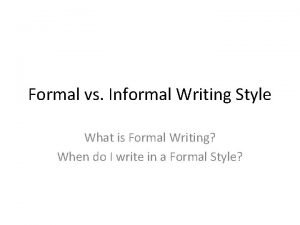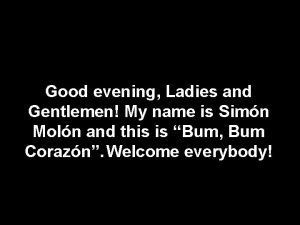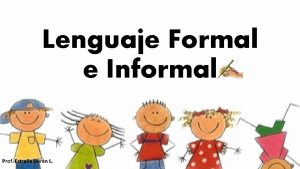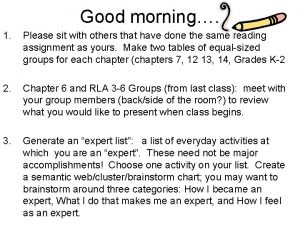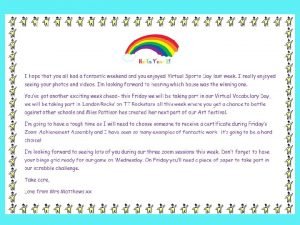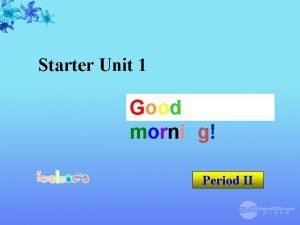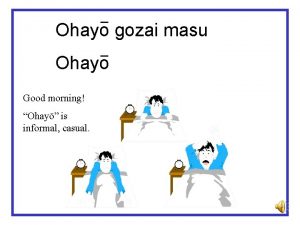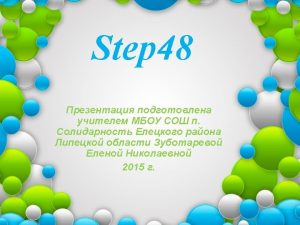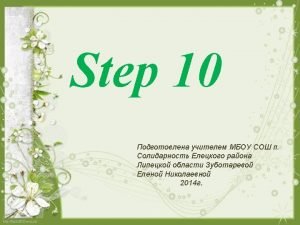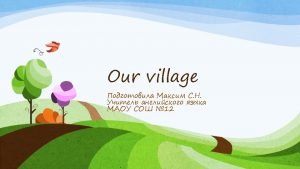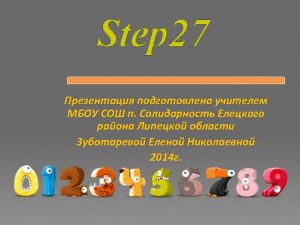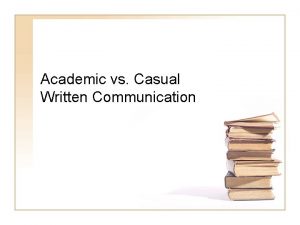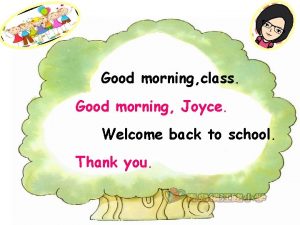Ohaygozaimasu Ohay Good morning Ohay is informal casual
















![Ittekimasu -いってきます So long! A politer form is, “Itte mairimasu. ” Both mean, “[I’m] Ittekimasu -いってきます So long! A politer form is, “Itte mairimasu. ” Both mean, “[I’m]](https://slidetodoc.com/presentation_image_h/206b935ff3661cae890939f7f912c0d5/image-17.jpg)











- Slides: 28

Ohayōgozaimasu - おはようございます Ohayō - おはよう Good morning! “Ohayō” is informal, casual.

Kon nichiwa – こんにちは Hi, how are you? Used during the day.

Konbanwa – こんばんは Good evening!

Oyasumi nasai – おやすみなさい Good night!

Sayōnara – さようなら Sayonara – さよなら Good-bye! The upper is more formal than the lower.

Osakini shitsurei shimasu おさきに しつれい します Good-bye, good night, etc. Used upon leaving. For example, when leaving work at the end of the day. It means: I’m going ahead of you. Please pardon me. A very polite way of saying “Good-bye. ”

Dōmo arigatō gozaimasu どうも ありがとう ございます Thank you very much.

Dōitashi mashite どういたしまして You’re welcome / Not at all. Say this in response to “Thank you. ”

Sumimasen – すみません I’m sorry. Excuse me.

Chotto matte kudasai – ちょっと まってください One moment, please.

Dewa mata –では また Ja mata – じゃ また “See you later. ” “See you soon. ” “Ja mata” is casual, friendly.

Mōichido onegai shimasu – もういちど おねがい します Please say it again. Please do it again.

Dōzo osakini – どうぞ おさ きに Please go ahead.

Ki o tsukete – きをつけて Be careful. Take care.

Odaijini – おだいじに Take care of yourself. Used toward an ill or injured person.

Itterasshai – いってらっしゃい So long. See you later. Literally, “Go and come back. ”
![Ittekimasu いってきます So long A politer form is Itte mairimasu Both mean Im Ittekimasu -いってきます So long! A politer form is, “Itte mairimasu. ” Both mean, “[I’m]](https://slidetodoc.com/presentation_image_h/206b935ff3661cae890939f7f912c0d5/image-17.jpg)
Ittekimasu -いってきます So long! A politer form is, “Itte mairimasu. ” Both mean, “[I’m] going and coming back. ”

Tadaima – ただいま I have returned. I’m home! Said by a person upon returning home.

Okaerinasai – おかえりなさい Welcome home.

Itadakimasu – いただきます Said before eating a meal.

Gochisōsamadeshita – ごちそうさまでした Said after eating a meal.

Omedetō gozaimasu – おめでとうございます Congratulations!

Hajimemashite – はじめまして Dōzo yoroshiku – どうぞよろしく Nice to meet you. Literally, “I’m meeting you for the first time (1 st line); please favor me (2 nd line).

Ogenki desuka? – おげんきですか? Ikaga desuka? – いかがですか? you? re a Dōdesuka? – どうですか? Hi, how Dōmo arigatō gozaimasu Thank you very much. Genki desu. I’m fine.

Otsukare sama deshita – おつかれさまでした Thank you very much. Used in response to “Good-bye, ” “good night, ”, or “Osakini Shitsurei Shimasu. ” It means, “Thank you for your hard work, which tired you out. ”

Mondai nai! – もんだいない! No problem!

Dame desu – だめです No good. Impossible. Out of the question.

私の名前は亮子・ポップジョイです。 My name is Ryoko Popjoy. Buffalo Grove Popjoy Kanji in black; Hiragana in red; and Katakana in blue. 私はバッファロー・グローヴに住む 日本語の先生です。 I am a Japanese teacher who lives in Buffalo Grove.
 Buenos afternoon
Buenos afternoon Good morning i'm glad to see you
Good morning i'm glad to see you Good morning professor eng
Good morning professor eng Good morning students
Good morning students Good evening everyone or everybody
Good evening everyone or everybody Hello good morning good afternoon
Hello good morning good afternoon Hello teacher good afternoon
Hello teacher good afternoon Good morning morning
Good morning morning Informal casual
Informal casual What is informal tone
What is informal tone Informal-casual
Informal-casual Gentleman good night ladies good morning
Gentleman good night ladies good morning Good morning revival
Good morning revival Good morning good lookin
Good morning good lookin Good evening ladies and gentlemen. we are now
Good evening ladies and gentlemen. we are now Good morning class how are you today
Good morning class how are you today Good thoughts good words good deeds zoroastrianism
Good thoughts good words good deeds zoroastrianism You are good when theres nothing good in me
You are good when theres nothing good in me Morning i see you in the sunrise
Morning i see you in the sunrise Brother john lyrics
Brother john lyrics Lenguaje formal e informal
Lenguaje formal e informal Good morning heroes
Good morning heroes Good morning florence
Good morning florence Good morning sit
Good morning sit Good morning peacock
Good morning peacock Good morning unicorns
Good morning unicorns Good morning one and all
Good morning one and all Starter
Starter Good morning and welcome back
Good morning and welcome back









